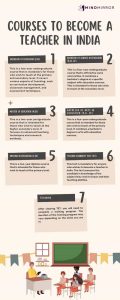Becoming a teacher in India is a challenging yet rewarding career choice. It requires a specific set of qualifications and a commitment to ongoing professional development. In this article, we will explore the steps and requirements on how to become a teacher In India, as well as the benefits and challenges of the profession.
Types of Teachers In India
There are several different types of teachers, each with its own unique responsibilities and roles. Some of the most common types of teachers include:
Classroom teachers:
These are the most common type of teachers and are responsible for teaching a specific subject or grade level in a traditional classroom setting.
Special education teachers:
These teachers work with students who have special needs, such as learning disabilities or behavioral issues. They typically have specialized training and education to help these students succeed in the classroom.
Online teachers:
With the rise of online learning, online teachers now play an important role in education. They use technology to deliver instruction and engage with students remotely.
Early childhood teachers:
These teachers work with young children, typically from ages 3 to 5. They focus on developing basic skills such as language, motor, and social skills.
Secondary school teachers:
These teachers teach students in grades 9-12 and typically specialize in a specific subject area.
Vocational teachers:
These teachers provide training and instruction in a specific trade or skill, such as welding, auto mechanics, or cosmetology.
College and university professors:
These teachers provide instruction and guidance at the post-secondary level, typically in a specific field of study.
Substitute teachers:
Substitute teachers fill in for regular classroom teachers when they are absent. They may work on a daily or long-term basis.
Tutors:
Tutors work one-on-one with students or in small groups to help them improve their skills and understanding of specific subjects.
This list is not exhaustive and there are many more types of teachers that exist. Overall, the type of teacher you become will depend on your qualifications, interests, and career goals.
Steps and Qualification To Become a Teacher In India
Becoming a teacher in India requires completing a specific set of steps and qualifications.
Education:
The first step to becoming a teacher in India is to complete your education. You will need to have at least a bachelor’s degree in the subject you wish to teach. If you wish to teach at the secondary level, you will need to have a bachelor’s degree in the relevant subject. If you wish to teach at the higher secondary level, you will need to have a postgraduate degree in the relevant subject.
Teacher Eligibility Test (TET):
After completing your education, you will need to clear the Teacher Eligibility Test (TET) which is conducted by the state government. This test is mandatory for anyone who wishes to become a teacher in India. The test assesses the candidate’s knowledge of the subject they wish to teach and their teaching abilities.
Training:
After clearing TET, you will need to complete a training program. The duration of the training program may vary depending on the state you are in. The training will provide you with the necessary knowledge and skills to become an effective teacher.
Applying for a teaching job:
After completing your training, you can apply for a teaching job in a school. The process for applying for a teaching job may vary depending on the state you are in. In general, you will need to fill out an application form and submit your resume, along with your TET scorecard and training certificate.
Certification:
After getting the job, you will need to get certified as a teacher. The certification process may vary depending on the state you are in. In general, you will need to pass an exam which assesses your teaching skills and knowledge of the subject you will be teaching.
Continuing Professional Development (CPD):
As a teacher, it is important to continue your professional development throughout your career. This can include attending workshops, completing online courses, and participating in other professional development activities.
To sum up, becoming a teacher in India requires completing education, passing TET, completing training, getting a job, getting certification, and continuing professional development.
Also Read:
Pros and Cons of Becoming a Teacher
Becoming a teacher can be a rewarding and fulfilling career, but it also has its own set of pros and cons.
Pros:
- Making a difference: One of the biggest pros of becoming a teacher is the opportunity to make a difference in the lives of students. Teachers have the ability to shape the minds of the future and inspire their students to achieve their full potential.
- Job security: Teaching is a stable and secure profession. In most cases, once you have a teaching job, it is unlikely that you will lose it.
- Flexibility: Teaching jobs often come with a lot of flexibility, allowing you to balance your work and personal life.
- Good pay and benefits: Teaching can be a well-paying profession, and most teachers also receive benefits such as health insurance, retirement plans, and paid vacation time.
Cons:
- Long working hours: Teachers often have to put in long working hours, preparing lesson plans, grading papers, and attending meetings.
- Stressful: Teaching can be a stressful profession, as teachers are responsible for the education and well-being of their students.
- Lack of autonomy: Teachers often have to follow a set curriculum and may not have much control over what they teach.
- Limited opportunities for career advancement: Opportunities for career advancement in teaching can be limited, and many teachers stay in the same position for their entire career.
- Large class size: Teachers may have to deal with large class sizes which can be challenging to handle.
In conclusion, becoming a teacher can be a very rewarding and fulfilling career, but it also has its own set of pros and cons. It’s important to weigh these before making a decision about pursuing this career path.
Courses To Become a Teacher in India
To become a teacher in India, you will need to complete a specific set of education and training courses. These courses will vary depending on the level of teaching you wish to pursue and the state you are in. Here are some of the common courses that are required to become a teacher in India:
Bachelor of Education (B.Ed):
This is a two-year undergraduate course that is mandatory for those who wish to teach at the primary and secondary levels. It covers various aspects of teaching, such as curriculum development, classroom management, and assessment techniques.
Bachelor of Science in Education (B.Sc. Ed):
This is a four-year undergraduate course that is offered by some universities. It combines a bachelor’s degree in a specific subject with education courses. This is intended for those who wish to teach at the secondary level.
Master of Education (M.Ed):
This is a two-year postgraduate course that is intended for those who wish to teach at the higher secondary level. It focuses on advanced teaching techniques and research methods.
Bachelor of Arts in Education (B.A. Ed):
This is a four-year undergraduate course that is intended for those who wish to teach at the primary level. It combines a bachelor’s degree in arts with education courses.
Diploma in Education (D.Ed):
This is a two-year diploma course that is intended for those who wish to teach at the primary level.
Teacher Eligibility Test (TET):
This test is mandatory for anyone who wishes to become a teacher in India. The test assesses the candidate’s knowledge of the subject they wish to teach and their teaching abilities.
Training:
After clearing TET, you will need to complete a training program. The duration of the training program may vary depending on the state you are in.
It is important to note that the education and training requirements for teachers in India may vary depending on the state you are in. You should check with the appropriate authorities in your state to ensure that you meet the necessary requirements to become a teacher in India.
Average Annual Salary of a Teacher in India
The average annual salary of a teacher in India can vary depending on a number of factors such as the level of education, years of experience, location, and subject taught.
According to a recent survey, the average annual salary of a primary school teacher in India is around INR 2.5 – 3.5 Lakhs. While the average annual salary of a secondary school teacher is around INR 3 – 5 Lakhs. However, the salary of a teacher in government schools is generally lower compared to private schools.
The annual salary of a teacher in government schools ranges from INR 2.5 – 6 Lakhs, depending on the level of education, qualifications, and experience. While, the annual salary of a teacher in a private school ranges from INR 3 – 12 Lakhs, depending on the level of education, qualifications, and experience.
It’s important to note that these are averages and the salary range can vary greatly depending on the state and location of the school, and the qualifications and experience of the teacher. Teachers working in urban areas and high-paying private schools can earn higher salaries than those working in rural areas or government schools.
In addition to the basic salary, teachers in India may also receive other benefits such as health insurance, retirement plans, and paid vacation time.
Top College To Pursue Career as Teacher
There are several top colleges in India that offer education and training programs for aspiring teachers. Here are some of the top colleges to consider:
- National Council for Teacher Education (NCTE) approved colleges: These colleges offer Bachelor of Education (B.Ed) and Master of Education (M.Ed) programs that are recognized by the National Council for Teacher Education (NCTE), the regulatory body for teacher education in India.
- University of Delhi: The University of Delhi offers a range of education programs for aspiring teachers, including B.Ed, M.Ed, and Ph.D. in Education.
- Jawaharlal Nehru University (JNU): JNU offers a range of education programs, including M.Ed, M.Phil, and Ph.D. in Education.
- University of Calcutta: The University of Calcutta offers a range of education programs, including B.Ed, M.Ed, and Ph.D. in Education.
- Banaras Hindu University (BHU): BHU offers a range of education programs, including B.Ed, M.Ed, and Ph.D. in Education.
- Tata Institute of Social Sciences (TISS): TISS offers a range of education programs, including B.Ed, M.Ed, and Ph.D. in Education.
- University of Mumbai: The University of Mumbai offers a range of education programs, including B.Ed, M.Ed, and Ph.D. in Education.
- Jamia Millia Islamia: Jamia Millia Islamia offers a range of education programs, including B.Ed, M.Ed, and Ph.D. in Education.
- Aligarh Muslim University (AMU): AMU offers a range of education programs, including B.Ed, M.Ed, and Ph.D. in Education.
- Andhra University: Andhra University offers a range of education programs, including B.Ed, M.Ed, and Ph.D. in Education.
It’s important to note that this list is not exhaustive and there are many other colleges in India that offer education programs for aspiring teachers. When choosing a college, it’s important to consider factors such as the program’s accreditation, faculty, location, and reputation. Also, it’s important to note that the best college for you may depend on your specific career goals and interests.
Mind Mirror offers best career counselling in Jaipur that helps individuals explore and understand their career options. We offer a range of services such as career assessments, job search assistance, resume writing, and interview preparation. We also provide guidance on the education and training required for specific careers, as well as information on job outlook and salary expectations. The goal of aMind Mirror is to help individuals find a career that is both fulfilling and financially rewarding. They work with a diverse group of clients, from high school students to career changers, and provide a personalized approach to each client’s needs.





